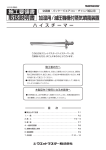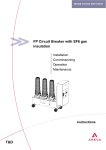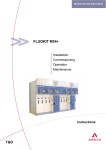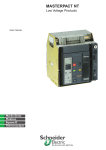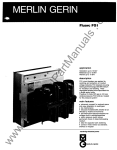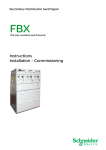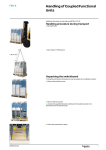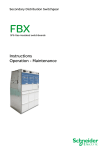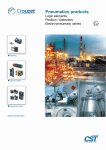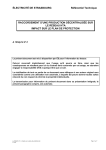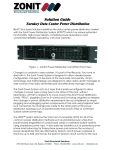Download Mechanical key-type interlocking Assembly - Operation
Transcript
Medium Voltage Distribution FBX Mechanical key-type interlocking Assembly - Operation Instructions www.schneider-electric.com FBX Content ■■ Introduction��������������������������������������������������������������������������������������������������������� 4 □□ Our Service Unit: our specialists, and suitably adapted services...��������������� 4 ■■ Overview�������������������������������������������������������������������������������������������������������������� 5 □□ Eco-design concept and revalorization of the materials used����������������������� 5 □□ Responsibilities ��������������������������������������������������������������������������������������������� 5 □□ Particular instructions for operations and interventions on energized equipment�� 5 □□ Other technical notices to be consulted��������������������������������������������������������� 5 □□ Symbols & conventions���������������������������������������������������������������������������������� 5 □□ Tools (not supplied) required for the operations described in this user manual��������������������������������������������������������������������������������������������������������������� 6 □□ Tightening torque values for standard assemblies (nut + bolt)���������������������� 6 □□ Symbols representing the actual position of the keys����������������������������������� 6 ■■ General���������������������������������������������������������������������������������������������������������������� 7 □□ Interlocking by locks��������������������������������������������������������������������������������������� 7 □□ Operations and exploitation instructions�������������������������������������������������������� 7 □□ Changes or modification to installations�������������������������������������������������������� 7 □□ Locations of key-locks on the control panel��������������������������������������������������� 7 □□ Installation of key-type interlocks on site������������������������������������������������������� 7 ■■ ”Operating” interlocks��������������������������������������������������������������������������������������� 8 □□ Role and applications������������������������������������������������������������������������������������� 8 □□ Interlocking the 'ring' between two Functional Units�������������������������������������� 8 □□ Use of 'ring' interlock between 2 C functions������������������������������������������������� 8 □□ Use of 'ring' interlock between 2 C functions, with connection in parallel forbidden���������������������������������������������������������������������������������������������������������������� 9 □□ Non-return interlock – HV/LV/Transformer����������������������������������������������������� 9 □□ Use of HV/LV/Transformer non-return interlocking on a T1 function����������� 10 □□ Use of HV/LV/Transformer non-return interlocking on a T2 function����������� 11 ■■ Installation of operating interlocks����������������������������������������������������������������� 12 □□ Ordering key-type interlocks������������������������������������������������������������������������ 12 □□ Spare key supply����������������������������������������������������������������������������������������� 12 □□ Lock and key references������������������������������������������������������������������������������ 12 □□ General installation precautions������������������������������������������������������������������� 13 □□ Intervention levels���������������������������������������������������������������������������������������� 13 □□ Interlocking assemblies using locks (Earthing switch open – load break switch open)����������������������������������������������������������������������������������������������������� 13 □□ Preparation of the Functional Unit��������������������������������������������������������������� 13 ■■ Preparation of an earthing switch key-type interlock sub-assembly��������� 15 □□ Context��������������������������������������������������������������������������������������������������������� 15 □□ Precautions�������������������������������������������������������������������������������������������������� 15 □□ Fitting of two Ronis Nogapi locks����������������������������������������������������������������� 15 ■■ Fitting an earthing switch key-type interlocking assembly������������������������� 19 □□ General�������������������������������������������������������������������������������������������������������� 19 □□ Supply (interlock kit)������������������������������������������������������������������������������������� 19 □□ Identification and locking out of the Functional Unit to be equipped with an interlocking device������������������������������������������������������������������������������������������� 19 □□ Fitting of an earthing switch key-type interlock assembly to a C function��� 19 □□ Preparation of the front plate����������������������������������������������������������������������� 21 □□ Operating tests��������������������������������������������������������������������������������������������� 22 ■■ Preparation of a load-break switch key-type interlock sub-assembly�������� 23 □□ Context��������������������������������������������������������������������������������������������������������� 23 □□ Precautions�������������������������������������������������������������������������������������������������� 23 □□ Fitting a Profalux Nogapi lock���������������������������������������������������������������������� 23 • Fitting a barrel on to the support���������������������������������������������������������������� 23 • Equipment for the support�������������������������������������������������������������������������� 24 □□ Assembly of two Ronis Nogapi locks����������������������������������������������������������� 26 2 AMTNoT153-02 FBX Content (contd.) • Equipment for the support�������������������������������������������������������������������������� 27 □□ Locks with micro-switches��������������������������������������������������������������������������� 27 ■■ Fitting a load-break switch key-type interlocking assembly����������������������� 28 □□ General�������������������������������������������������������������������������������������������������������� 28 □□ Supply (interlock kit)������������������������������������������������������������������������������������� 28 □□ Identification and locking out of the Functional Unit to be equipped with an interlocking device������������������������������������������������������������������������������������������� 28 □□ Location of the assembly����������������������������������������������������������������������������� 29 □□ Removal of the interlocking device�������������������������������������������������������������� 29 □□ Extraction of the mechanical control mechanism���������������������������������������� 29 □□ Installation of the interlocking device of the load-break switch�������������������� 31 • Fitting the interlocking device end stop������������������������������������������������������ 32 □□ Preparation of the front plate����������������������������������������������������������������������� 33 □□ Mechanical operation tests�������������������������������������������������������������������������� 33 ■■ Notes������������������������������������������������������������������������������������������������������������������ 34 AMTNoT153-02 3 FBX Introduction Operations and maintenance may only be carried out by personnel who have received suitable authorisation for the operations and manoeuvres they are responsible for performing. If this is not the case, please refer to our Service Unit or Training Centre. All locking-out operations must be performed according to the "General Safety Instructions booklet for Electrical Applications" UTE C 18 510 (or its equivalent outside FRANCE). Our Service Unit: our specialists, and suitably adapted services... ■■ Guarantee extension contracts in relation to the selling of new equipment. ■■ Supervision of HVA switchgear installations. ■■ Technical advice, diagnoses of the facilities, expertise. ■■ Maintenance contracts adapted to operational constraints. ■■ Systematic or conditional preventive maintenance. ■■ Corrective maintenance in case of partial or complete failure. ■■ Supply of spare parts. ■■ Overhauling of equipment and requalification of installations in order to benefit from new technologies and extend the life of your switchgear by limited investments. Contact the Schneider Electric Service Unit for diagnoses and advice: Working hours 33 (0)3 85 29 35 00 33 (0)3 85 29 36 30 or 33 (0)3 85 29 36 43 4 7 days per week/ 24 hours per day Free phone No: 0 800 40 27 62 AMTNoT153-02 FBX Overview © - Schneider Electric - 2010. Schneider Electric , Schneider Electric logo and their figurative forms are Schneider Electric registered trademarks. The other brand names mentioned within this document, whether they be copyright or not, belong to their respective holders. Eco-design concept and revalorization of the materials used The design and life cycle of the equipment and switchgear manufactured by Schneider Electric take environmental requirements into account (see page 10). The design and manufacture of our packaging are both in conformity with the French government decree N° 98-638 of 20 July 1998, concerning the account that is taken of environmental requirements. Responsibilities Our devices are quality controlled and tested at the factory in accordance with the standards and the regulations currently in force. Apparatus efficiency and apparatus life depend on the compliance with the installation, commissioning and operation instructions described in this user manual. Non respect of these instructions is likely to invalidate any guarantee. Local requirements especially about safety and which are in accordance with the indications given in this document, must be observed. Schneider Electric declines any responsibility for the consequences: ■■ due to the non respect of the recommendations in this manual which make reference to the international regulations in force, ■■ due to the non respect of the instructions by the suppliers of cables and connection accessories during installation and fitting operations, ■■ of any possible aggressive climatic conditions (humidity, pollution, etc.) acting in the immediate environment of the materials that are neither suitably adapted nor protected for these effects. This user manual does not list the locking-out procedures that must be applied. The interventions described are carried out on de-energized equipment (in the course of being installed) or locked out (non operational). Particular instructions for operations and interventions on energized equipment When commissioning and operating the equipment under normal conditions, the General safety instructions for electrical applications must be respected, (protective gloves, insulating stool, etc.), in addition to standard operating instructions. All manipulations must be completed once started. The durations (for completing the operations mentioned) given in the maintenance tables are purely an indication and depend on on-site conditions. Other technical notices to be consulted ■■ AMTNoT131 FBX (IS) Installation - Commissioning ■■ AMTNoT132 FBX(IS) Operations - Maintenance ■■ AMTNoT146 FBX (C13100) Operations - Maintenance Symbols & conventions Code for a product recommended and marketed by Schneider-Electric Tightening torque value Example: 1.6 daN.m Mark corresponding to a key CAUTION! Remain vigilant! Precautions to be taken in order to avoid accidents or injury FORBIDDEN! Do not do it! Compliance with this indication is compulsory, non compliance with this stipulation may damage the equipment. IINFORMATION - ADVICE Your attention is drawn to a specific point or operation AMTNoT153-02 5 FBX Overview (contd.) Tools (not supplied) required for the operations described in this user manual Spanners: 7 ; 10 ; 13 ; 16 ; 26 mm 40 R.16 open-ended spanner Ratchet handle + 2 extensions + universal joint + socket sizes 10 and 13 mm Torque wrench + socket sizes 16, 26 Allen key for hexagonal screw size 3, 4 Flat headed screwdriver Hammer + Pin punch File Torx 2.5 screwdriver Reamer Tightening torque values for standard assemblies (nut + bolt) Threaded fasteners without grease: assembly with ungreased washers. Threaded fasteners with grease: mounted with the washer greased. Use grease referenced: Diameter Zinc plated steel fasteners Stainless steel fasteners without grease (daN.m) with grease (daN.m) Class 6.8 Class 8.8 A2-70 M6 0.7 0.9 0.7 M8 1.6 2.1 1.6 M 10 3.2 4.3 3.2 M 12 5 6.6 5 M 14 8.7 11.6 8.7 M 16 13.4 17.9 13.4 M 20 26.2 35 26.2 Symbols representing the actual position of the keys ■■ Key free - fitted. ■■ Key absent. ■■ Key captive. 6 AMTNoT153-02 FBX General Interlocking by locks Interlocking using key-locks is a necessary requirement to: Guarantee certain operational functions, ■■ have the switchgear controlled by a line isolator or earthing switch, ■■ block access. This manual deals with the two types of key-lock-type locking: ■■ locking a function, Operational interlocking Operations and exploitation instructions The information given in this manual is required for the elaboration of operating instructions and use of the equipment. These procedures are specific to each individual installation and are produced by the customer. The instructions for operational use must be displayed on the Functional units concerned. Changes or modification to installations Any changes or modifications to the installations must trigger an update of the padlock interlock orders and the associated documents. A general interlock plan must be systematically drawn up and updated as and when the installation is changed. Locations of key-locks on the control panel Function C Key 2 1 2 3 4 5 1 4 Lock load-break switch "open" Additional lock Load-break switch "Open" Key-lock - Earthing switch “Open” Key-lock - Earthing switch “Closed” Lock load-break switch "Open" 3 Functions T1 and T1c 5 4 3 Installation of key-type interlocks on site The installation of key-type interlocks requires: ■■ Purchase of the components and elements required, ■■ The use of suitable tools, (See page 6), ■■ Fitting instructions (see page15 & 19). AMTNoT153-02 7 FBX ”Operating” interlocks Role and applications Operational interlocks are used to control the sequences of operational manoeuvres and lockout operations under normal service and safety conditions. Interlocking the 'ring' between two Functional Units Conditions the closing of the earthing switch on a Functional Unit in relation to the opening either of a load-break switch or the line isolator on the second Functional Unit. Only applies to C functions (see page 8). There is no 'ring' interlock between the 2 T2 functions. Use of 'ring' interlock between 2 C functions Commissioning De-energizing ■■ The earthing switches are locked ”open” using keys 1 & 2. ■■ Open load-break switch C2 and lock with key 2. ■■ Close the earthing switch. ■■ Keys 1 and 2 should be present in the locks of ”open” load-break switches. ■■ Recover Key 2. ■■ Return to C2. ■■ Unlock then close the switches. ■■ Go to C1. ■■ Introduce Key 1 into the earthing switch lock and unlock immediately. ■■ Open load-break switch and lock with key 1. ■■ Verify that there is no voltage across the voltage indicator units. ■■ Recover Key 1. ■■ Close the earthing switch. ■■ Introduce Key 2 into the earthing switch lock and unlock it immediately. ■■ Check that there is no voltage across the voltage indicator units. FBX 1: C -... FBX 2: C -... 1 2 C1 2 8 & 1 AMTNoT153-02 FBX ”Operating” interlocks (contd.) Use of 'ring' interlock between 2 C functions, with connection in parallel forbidden Commissioning De-energising the 'ring', with passage of the second "incoming feeder" ■■ The earthing switches C2 & C3 are locked ”open” using keys 1 & 2. ■■ Open load-break switch C2 and lock with key 1, then key 3. ■■ Close the earthing switch. ■■ Keys 1 and 2 should be present in the locks of ‘open’ load-break switches. ■■ Recover keys 1 & 3. ■■ Return to C2. ■■ Lock the load-break switch C1 with key 3. ■■ Introduce key 3 into the lock of the load-break switch C1 and unlock it immediately. ■■ Introduce Key 2 into the earthing switch lock and unlock immediately. ■■ Recover Key 3. ■■ Close the load-break switch C1. ■■ Verify that there is no voltage across the voltage indicator units. ■■ Introduce this key into the second lock of the load-break switch C2 and unlock it immediately. ■■ Go to C3. ■■ Close the earthing switch. ■■ Close the load-break switches C2 & C3. ■■ Recover Key 2. ■■ Introduce Key 1 into the earthing switch lock and unlock it immediately. ■■ Check that there is no voltage across the voltage indicator units. FBX 1: C - C - T1 3 FBX 2: C -... 3 1 2 C1 C2 2 C3 1 Non-return interlock – HV/LV/Transformer Prohibits access to the Functional Unit's cable compartment and transformer as long as the Functional Unit and the LV circuit breaker are in service (closed). Applies to Functional Unit's T1 (see page 10) and T2 (see page 10). AMTNoT153-02 9 FBX ”Operating” interlocks (contd.) Use of HV/LV/Transformer non-return interlocking on a T1 function Commissioning De-energizing ■■ Lock earthing switch "open" using Key 1. ■■ Open the load-break switch of function T1. 1st case, insulated transformer: ■■ Go to the low voltage switchboard, introduce Key 1 into the CB lock and unlock it immediately. ■■ Go to the LV switchboard, open and unplug the main CB. □□ unlock transformer access (or plugin terminals) using Key 2. ■■ Plug in then close the LV CB. ■■ Lock this CB in its ‘withdrawn’ position using Key 1. 2nd case, transformer with a double lock fitting: ■■ Come back to function T1. ■■ Recover key 1 and go back to function T1. □□ introduce key 1 into the transfer lock, ■■ Close the load-break switch of the function T1. ■■ Introduce Key 1 into the earthing switch lock and unlock it immediately. □□ recover key 3 to gain access to the transformer ■■ Check that there is no voltage across the voltage indicator units. 3rd case, transformer (with metalclad enclosure), > 2000kVA or with external plug-in terminals: ■■ Close the earthing switch. □□ introduce key 2 into the transfer lock, ■■ Lock earthing switch using Key 2. □□ recover key 3 to gain access to the transformer ■■ Go to the transformer. □□ recover key 4 to gain access to the transformer or the plug-in terminals. Low Voltage 2 3 4 Function T1 3 RU 1 3) Transformer (with enclosure) > 2000kVA or with external plug-in terminals 4 1 Low Voltage 3 2 1 2) Transformer with a double lock fitted 23 RU Low Voltage 2 1 1) Insulated transformer or GE 10 1 Generator Unit AMTNoT153-02 FBX ”Operating” interlocks (contd.) Use of HV/LV/Transformer non-return interlocking on a T2 function Commissioning De-energizing ■■ Earthing Switch is already locked ‘open’ with key 1. ■■ Trip the circuit breaker. 1st case, insulated transformer: ■■ Recover Key 1. ■■ Open the line isolator. □□ unlock transformer access (or plugin terminals) using Key 2. ■■ Go to the low voltage circuit breaker, introduce Key 1 into the CB lock and unlock it immediately. ■■ Go to the LV switchboard, open and unplug the master circuit breaker. 2nd case, transformer with a double lock fitting: ■■ Plug in then close the LV circuit breaker. ■■ Lock this circuit breaker in its ‘withdrawn’ position using Key 1. □□ unlock transformer access with key 2, ■■ Return to the Functional Unit. ■■ Recover key 1 and go back to function T2. □□ recover key 3 to unlock the plug-in terminals. ■■ Close the line isolator. ■■ Introduce Key 1 into the earthing switch lock and unlock it immediately. 3rd case, transformer (with metalclad enclosure), > 2000kVA or with external plug-in terminals: ■■ Re-arm and trip the circuit breaker. ■■ Check that there is no voltage across the voltage indicator units. □□ introduce key 2 into the transfer lock, ■■ Close the earthing switch. □□ recover key 3 to gain access to the transformer, ■■ Lock earthing switch using Key 2. □□ recover key 4 to gain access to the transformer or the plug-in terminals. ■■ Go to the transformer. Low Voltage 2 3 4 Function T2 3 RU 1 3) Transformer (with enclosure) > 2000kVA or with external plug-in terminals 4 Low Voltage 3 1 2) Transformer with a double lock fitted 1 23 RU 2 Low Voltage 2 1 1) Insulated transformer RU 1 GE AMTNoT153-02 Generator Unit 11 FBX Installation of operating interlocks Ordering key-type interlocks For all interlock orders, it is necessary to enclose the material characteristics data sheet. Clearly identify the mechanical control type mechanism before ordering the interlock kit. Stating: ■■ The type of lock chosen (Ronis or Profalux), ■■ The type of interlock. Spare key supply On request, Schneider Electric may sometimes supply spare keys to locks. The spare keys must be kept in a dedicated, closed, key safe (not supplied). Lock and key references Use FBX function + Low Voltage (LV) Description 1/4 turn left 1/4 turn right Transformer (TR) door lock TR + LV special lock Deadlocks Profalux PBA90GPS3003 PBA90DPS3003 PSP1CPS3000 PSP2FPS3000 PVE11CPS3000 Ronis Use RBA90GEL3003 RBA90DEL3003 RSP1CEL3000 RSP2FEL3000 RVE11CEL3000 LV GE Description 1/4 turn right Profalux Ronis key switch transfer lock Wrench PBA90DPS3333 PVC11CPS3000 PST3PS3000 PCHF5 RBA90DEL3333 RVC11CEL3000 RCEL5 RST3EL3000 ■■ Representative of a ¼ turn left to leave the key captive. Ronis Direction A ■■ Representative of a ¼ turn right to leave the key captive. Ronis Direction B 12 AMTNoT153-02 FBX Installation of operating interlocks (contd.) General installation precautions Prior to fitting the locks, mark the direction and location on the plate. Respect the tightening Torques. DO NOT OVER TIGHTEN. Intervention levels Definition Levels Operations recommended in the instructions manual "installation - operation maintenance", carried out bysuitably qualified personnel having received training allowing them to intervene whilst respecting the safety rules. 1 Complex operations, requiring specific expertise and the implementation of support equipment in accordance with Schneider Electric procedures. These are carried out by Schneider Electric or by a specialised technician, trained by Schneider Electric in the implementation of procedures, and who is equipped with specific equipment. 2 All preventive and corrective maintenance, all renovation and reconstruction work is carried out by Schneider Electric. 3 Interlocking assemblies using locks (Earthing switch open – load break switch open) Fitting of locks Levels Functions 1 2 3 Preparation of the locking casing of the earthing switch - ■ ■ Fitting locking operations by keylocks to the earthing switch - ■ ■ Preparation of the locking casing of the load-break switch - ■ ■ Fitting a lock-type interlock on the load-break switch - ■ ■ Preparation of the Functional Unit Intervention Duration Busbar Cables Load-break Earthing switch switch Normal 1h Deenergized Deenergized Open Open Possible 1h Energized Energized Open Open Locking out the Functional Unit All locking-out operations must be performed according to the particular rules for the network concerned. Tools required: Please refer to page 6. If wiring is present: ■■ de-energize the LV auxiliary power supplies. ■■ disconnect all of the wires connected to the control mechanism. For all interlocking installation operations, it is necessary to remove the FBX front plate. AMTNoT153-02 13 FBX Installation of operating interlocks (contd.) ■■ Unscrew the 2 fixing screws of the panel (size 4 Allen key). ■■ Remove the panel. 14 AMTNoT153-02 FBX Preparation of an earthing switch key-type interlock sub-assembly Context In the supply of a key-type interlock kit, this assembly is already done. Therefore, go to page 19 directly. Nevertheless, in certain cases, (modifications, replacement, etc.), these assemblies may have to be removed and then re-fitted on the site. Precautions For fitting the locks, it is necessary to mark their direction and their location on the plate in accordance with page 7. Interlocks 1/4 turn left 1/4 turn right Earthing switch Open Closed Fitting of two Ronis Nogapi locks ■■ Insert a ring on to each barrel of the lock. ■■ Position the barrels on the support. ■■ Fix the barrels on to the support (26 mm spanner). ■■ Tighten to the indicated torque. 1 ■■ Fit the probe with a CHC M4x12 bolt + ES4 washer + Nylstop nut. ■■ Do not tighten this bolt . AMTNoT153-02 15 FBX Preparation of an earthing switch key-type interlock sub-assembly (contd.) ■■ Apply grease to the 2 faces of the slide of the probe. ■■ Place an M6 flat washer on to this stud, with a small deposit of grease. ■■ Position the probe as shown. ■■ Fix the probe using a CHC M4x6 bolt + ES4 washer + M4 washer (Allen key size 3). ■■ Hook on the spring to the mobile blanking piece. 16 AMTNoT153-02 FBX Preparation of an earthing switch key-type interlock sub-assembly (contd.) ■■ Hook on the spring to the support. ■■ Position the mobile blanking piece as shown. Remain vigilant because in this position, the spring is taut. ■■ Insert the keys and turn them to place them in a flat position. ■■ Position the 2 shims: the narrowest part at the bottom. ■■ Position the 2 shims as shown. ■■ Position the cams as shown ■■ Screw on the nut positioned at the extremity to maintain all of the equipment on each barrel. AMTNoT153-02 17 FBX Preparation of an earthing switch key-type interlock sub-assembly (contd.) ■■ Tighten to the indicated torque. (16mm spanner). 0.25 0.25 ■■ Apply grease to the 2 faces of all of the slots of the blanking piece. ■■ Position the blanking piece in its location. ■■ Fix the blanking piece using 2 CHC M4x6 bolts + ES4 washers + M4 flat washers (Allen key size 3). ■■ Tighten the 2 screws. ■■ Position the probe in order to operate either of the keys. ■■ Make sure that the keys turn easily and that there is no friction. 18 AMTNoT153-02 FBX Fitting an earthing switch key-type interlocking assembly General Intervention Duration Busbar Cables Load-break Earthing switch switch Normal 1 h 30 Deenergized Deenergized Open Closed Possible 1 h 30 Energized Energized Open Closed Locking out the Functional Unit All locking-out operations must be performed according to the particular rules for the network concerned. Tools required: please refer to page 6. Parts required: interlock kit (see Supply (interlock kit)). Supply (interlock kit) Key 1 Locking devices 2 Captive nut (positioned on the support waiting to be assembled on to the FBX cross-member) 3 Assembly bolt not tightened 4 Fixing bolt Identification and locking out of the Functional Unit to be equipped with an interlocking device On the table, identify the position of the Functional Unit to be equipped (1, 2, 3 or 4). See lock out instructions in page 13. If necessary lock out the load-break switches and earthing switches. Fitting of an earthing switch key-type interlock assembly to a C function ■■ The interlocking device is equipped with (see page 15). ■■ Remove the front panel (Allen key size 4). ■■ Mark the position of the interlocking device. AMTNoT153-02 19 FBX Fitting an earthing switch key-type interlocking assembly (contd.) ■■ Recover the 2 captive nuts and slide them on to the 2 holes of the front cross member. ■■ Insert the entire device through the inside of the compartment. If necessary remove the locking devices of the panel in accordance with page 29 ■■ Position vertically the device on to its 2 fixing points. ■■ Check that the mobile blanking piece is in its housing. ■■ Align and fix the device using the 2 screws, without tightening them. 20 AMTNoT153-02 FBX Fitting an earthing switch key-type interlocking assembly (contd.) 10 mm ■■ Functions C & T1: position a shim under the probe in order to obtain the 10 mm dimension. ■■ Function T2: no shim. ■■ Assemble the probe and the earthing switch position indicator with the bolt supplied (Allen key size 3 + 7 mm open-ended spanner). ■■ Check that the key turns easily, without blocking in the barrel of the lock. ■■ Displace the assembly laterally and in depth to obtain the correct operation. ■■ Tighten the 2 fixing screws. Preparation of the front plate ■■ Mark the cut-out to be removed from the plate. AMTNoT153-02 21 FBX Fitting an earthing switch key-type interlocking assembly (contd.) ■■ Using a hammer and a large pin punch, remove the cut-out. ■■ If necessary, slightly file down the parts which are not completely flat and smooth. ■■ Re-fit the front plate on to the Functional Unit C (Allen key size 4). Operating tests Proceed with operating mechanical tests of the interlocking device. 22 AMTNoT153-02 FBX Preparation of a load-break switch key-type interlock sub-assembly Context With the supply of a key-type interlock kit, this assembly is already done. Therefore, go to chapter 9 directly. Nevertheless, in certain cases, (modifications, replacement, etc.), these assemblies may have to be removed and then re-fitted on the site. Precautions For fitting the locks, it is necessary to mark their direction and their location on the plate in accordance with page 7. Locking 1/4 turn left Load-break switch Open Fitting a Profalux Nogapi lock Fitting a barrel on to the support ■■ Insert a ring on to the barrel of the lock. ■■ Position the barrel on to the support, as shown. ■■ Tighten the nut (26 mm spanner). 1 ■■ Position the cam. AMTNoT153-02 23 FBX Preparation of a load-break switch key-type interlock sub-assembly (contd.) ■■ Introduce the key and turn it to place it in a flat position. ■■ Screw in and tighten the nut to the indicated torque whilst maintaining the barrel of the lock (key 40 R.16). 0.25 Equipment for the support ■■ Grease the part above and underneath the vertical lug of the support. ■■ Grease the passage slot of the blanking off piece. 26 ■■ Grease the 2 sides of the blanking off piece. 26 24 AMTNoT153-02 FBX Preparation of a load-break switch key-type interlock sub-assembly (contd.) ■■ Insert the blanking off piece intothe slot of the support. ■■ At the same time, the lug of the suppport must go in to the notch of the blanking off piece. ■■ Maintain the blanking off piece raised whilst moving it on to its drive pin. ■■ Fit a flat washer. ■■ Fit the circlips. AMTNoT153-02 25 FBX Preparation of a load-break switch key-type interlock sub-assembly (contd.) ■■ Hook on the spring in to the indicated hole, at the rear of the support. ■■ Hook the other extremity of the spring on to the drive pin. ■■ Check that the device is functioning properly whilst operating the key several times. Assembly of two Ronis Nogapi locks ■■ Directly fix the barrels on to the locks of the support (1). ■■ Tighten the nuts (26 mm spanner). 1 1 ■■ Place the spring (2). 26 AMTNoT153-02 FBX Preparation of a load-break switch key-type interlock sub-assembly (contd.) ■■ Position the 2 cams (3) as shown above. ■■ Tighten the nuts (key 40 R.16). ■■ Position the spring (4). 0.25 Equipment for the support Proceed in exactly the same way as for chapter "Equipment for the support" in page 23. Locks with micro-switches ■■ The micro-switch is fixed on to the rear side of the device. ■■ The micro-switch is held in place by 2 screws moderately tightened. ■■ The wiring loom is connected up by two elbowbend lugs. AMTNoT153-02 27 FBX Fitting a load-break switch key-type interlocking assembly General Intervention Duration Busbar Cables Load-break Earthing switch switch Normal 1 h 30 Deenergized Deenergized Open Closed Possible 1 h 30 Energized Deenergized Open Closed Locking out the Functional Unit All locking-out operations must be performed according to the particular rules for the network concerned. Tools required: please refer to page 6. Parts required: ■■ interlock kit (see page 28), ■■ shim. Supply (interlock kit) Key 1 Fitted support 2 Bolts 3 Self-locking washer 4 Additional self-locking washer for T1 5 End stop 6 Self-tapping screws 7 Self-locking washer 8 Flat washer Identification and locking out of the Functional Unit to be equipped with an interlocking device On the switchboard, identify the position of the function to be equipped (1, 2, 3 or 4). See lock out instructions in page 13. If necessary, lock out the load-break switches and earthing switches. 28 AMTNoT153-02 FBX Fitting a load-break switch key-type interlocking assembly (contd.) Location of the assembly ■■ The mechanical control mechanism is accessible. ■■ The locking operation by keylocks will be fitted in the upper part. Removal of the interlocking device ■■ Using a marker, mark out the position of the vertical locking device on its support. ■■ Unscrew and remove the 2 fixing bolts (2 open-ended spanners size 10). ■■ Extract the vertical locking device. Extraction of the mechanical control mechanism ■■ Insert the earthing switch lever. ■■ Operate the earthing switch very slowly so that its blades are lifted. AMTNoT153-02 29 FBX Fitting a load-break switch key-type interlocking assembly (contd.) ■■ Position the shim on the lower rear side of the spring. ■■ Leave the earthing switch to rest again on this shim. ■■ The shim is in place. ■■ Remove the operating lever for the earthing switch. ■■ Unscrew the 4 self-locking fixing nuts (3 to the left, 1 to the right) of the control mechanism. 1.6 1.6 1.6 1.6 ■■ Use gloves to take hold of the control mechanism. ■■ Extract the control mechanism whilst pulling the 2 drive rods in the lower part. 30 AMTNoT153-02 FBX Fitting a load-break switch key-type interlocking assembly (contd.) Installation of the interlocking device of the load-break switch (for the marks, see page 28) ■■ Place the mechanical control mechanism in a flat position. ■■ Screw in the 2 screws by two threads (2) with 1 washer each (3). Place 2 washers under each screw for a functional interlocking T1. ■■ Grease the passage of the support. 26 ■■ First of all, insert the support (1) on to the 2 bolts, between the washers and the plate of the mechanical control mechanism. ■■ Then secondly, hook the small lug on at the front of the support, behind the back of the plate. AMTNoT153-02 31 FBX Fitting a load-break switch key-type interlocking assembly (contd.) ■■ Then centre the support in the passage slot, which has been previously greased. ■■ Align the support in relation to the edge of the mechanical control mechanism. ■■ Check the free functioning of the interlocking device. The key must go back to the original position. ■■ Tighten the 2 fixing screws of the support, whilst checking the free functioning of the interlocking device. ■■ Re-fit the mechanical control mechanism on to the FBX, whilst poceeding in reverse order as for dismantling (see page 29). Replace the 4 self-locking nuts by new ones. Tighten to the indicated torque. Fitting the interlocking device end stop (for the marks, see page 28) ■■ Very lightly bore the 2 holes of the fixing screws. ■■ Place the end stop (5). Screw in the 2 screws (6) (+ washers 7 and 8) without tightening (Torx 2,5 screwdriver). It is necessary to close the load-break switch to adjust the end stop. Caution, the busbar may be energised ! 32 AMTNoT153-02 FBX Fitting a load-break switch key-type interlocking assembly (contd.) ■■ Slightly incline the end stop to avoid it leaving the cam when in operation. ■■ Keep a space of 1.5 to 2mm between the end stop and the cam. This space avoids any risk of shock during the operations. 6SDFH ■■ Moderately tighten the 2 screws. Preparation of the front plate ■■ Remove the corresponding cap of the lock. ■■ If necessary, slightly file down the parts which are not completely flat and smooth. ■■ Replace the plate. Mechanical operation tests Proceed with mechanical operating mechanical tests of the interlocking device. AMTNoT153-02 33 Appendices 34 Notes AMTNoT153-02 Appendices AMTNoT153-02 Notes 35 © 2011 Schneider Electric - All Rights Reserved Schneider Electric 35, rue Joseph Monier CS 30323 92506 Rueil-Malmaison Cedex, France RCS Nanterre 954 503 439 Capital social 896 313 776 € www.schneider-electric.com AMTNoT153-02 As standards, specifications and designs change over time, request confirmation of information provided in this publication. This document was printed on environmentally friendly paper Publication: Schneider Electric Design: Schneider Electric Printing: 12-2010




































